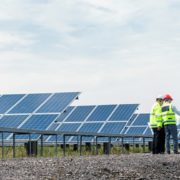Tag Archives | John Beirne
Economics, Finance sector development
 Climate change, Finance sector development
Climate change, Finance sector development
 Economics, Finance sector development
Economics, Finance sector development
 Economics, Finance sector development, Health
Economics, Finance sector development, Health
 Climate change, Economics, Environment, Finance sector development
Climate change, Economics, Environment, Finance sector development
 Economics, Finance sector development
Economics, Finance sector development
 Economics
Economics

Foreign holdings of local currency bonds: A double-edged sword for emerging Asia

Local currency bond markets (LCBMs) have continued to develop in emerging Asian economies since the early 2000s, with foreign investor participation rising markedly since the global financial crisis of 2007–2008. LCBMs help to enhance domestic financial stability by enabling governments and companies to borrow in domestic currency.
Which financing sources matter for private investment in renewable energy in Asia?

The mobilization of climate finance is critical for limiting global warming to within 1.5°C and preventing catastrophic climate change (IPCC 2018). Annual green investments totaling $1.5 trillion are needed (United Nations 2017). Despite the falling cost of renewable energy technologies, energy investments remain dominated by investments in fossil fuels. In Asia and the Pacific, annual investments fell after 2017 and until 2020 remained below the 2017 level.
Do persistent current account imbalances hamper regional and global growth?

Current account surpluses have persisted in a number of Asian and European economies throughout the global financial crisis and thereafter. Along with Germany, Japan has a decades-long history of recording current account surpluses. Due to rapid improvements in the competitiveness of its manufacturing sector, Japan has almost continuously recorded trade surpluses since the mid-1960s, and as a result, record current account surpluses (Shirakawa 2011).
COVID-19 and policy responses through the lens of global asset markets and capital flows

The coronavirus disease (COVID-19) pandemic and the resulting lockdowns have led to an unprecedented economic contraction and turbulence in financial markets, which initially caused the largest ever outflows of portfolio capital from emerging market economies (EMEs). Globally, governments have responded to the crisis with substantial fiscal stimulus packages. In addition, central banks around the world have eased monetary policies, with many EME central banks also implementing quantitative easing (QE) measures for the first time.
Exploring the link between climate change and sovereign risk

Climate change can have a material impact on sovereign risk through direct and indirect effects on public finances. In addition, climate change raises the cost of capital in climate vulnerable countries and threatens debt sustainability. Governments must climate-proof their economies and public finances or potentially face an ever-worsening spiral of climate vulnerability and unsustainable debt burdens.
Characterizing financial cycles: Are emerging markets different?

A feature of the academic literature on financial cycles relates to the fact that it almost exclusively focuses on selected advanced economies, the findings of which may not necessarily hold for emerging economies. Global capital flow developments and monetary policies in advanced economies mean that financial cycle dynamics may differ substantially in emerging economies, not only in terms of turning points but also with regard to which asset market cycle best characterizes the financial cycle.
Macroeconomic stabilization in the digital age: What should policy makers be aware of?

The rise of the digital age has created challenges for policy makers around the globe in managing their economies. Early work on this issue by Cecchetti (2002) noted that macroeconomic management becomes more complex in an environment of digitalization given shifting trend productivity and difficulties in estimating potential output.


Search
Subscribe / Connect to Asia Pathways
Subjects
- Accelerating Progress in Gender Equality
- Addressing Remaining Poverty and Reducing Inequality
- Agriculture and natural resources
- Capacity development
- Climate change
- Economics
- Education
- Energy
- Environment
- Finance and Innovation
- Finance sector development
- Gender
- Globalization and Economic Stability
- Governance and public sector management
- Health
- Industry and trade
- Information and Communications Technology
- Infrastructure
- Making Cities More Livable
- Miscellaneous
- Population
- Poverty
- Private sector development
- Regional cooperation and integration
- Sanitation
- Social development and protection
- Strengthening Governance and Institutional Capacity
- Subjects
- Transport
- Uncategorized
- Urban development
- Video Blog
- Water
Recent Posts
- From Crisis to Resilience: The Evolution of the Banking Sector in Asia and the Pacific
- Tariffs on the Table: What Could Be Asia’s Next Move?
- Investing in Childcare a Win for Women and the Economy
- Flush and Flourish: Upgraded Toilets Can Transform Lives in Rural Asia
- New Ways for Climate Finance and Development in Asia and the Pacific




Recent Comments